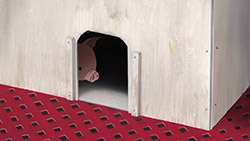 |
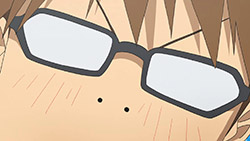 |
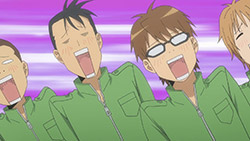 |
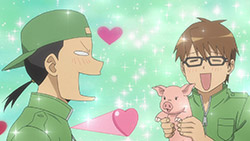 |
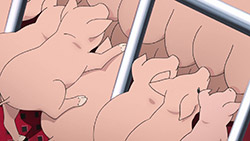 |
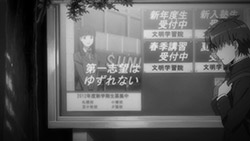 |
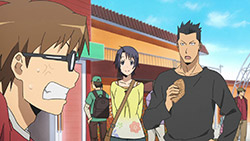 |
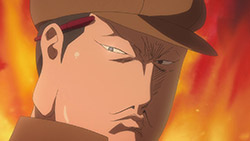 |
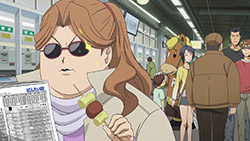 |
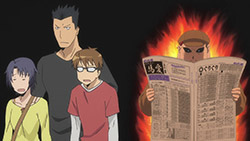 |
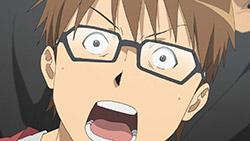 |
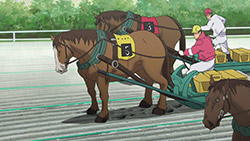 |
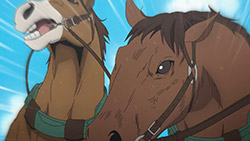 |
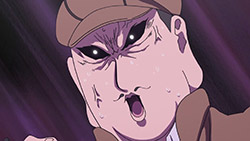 |
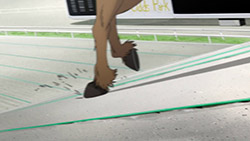 |
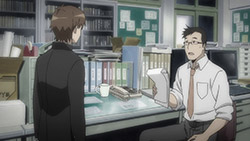 |
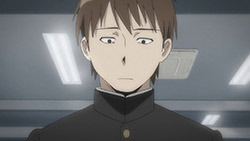 |
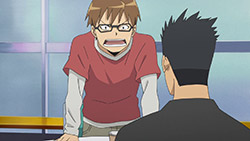 |
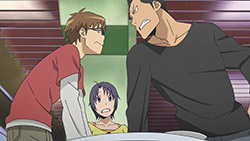 |
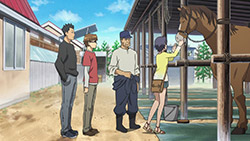 |
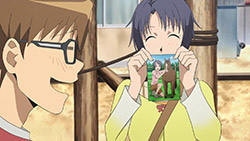 |
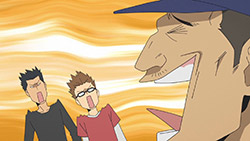 |
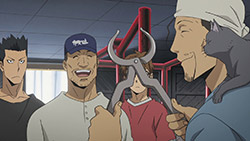 |
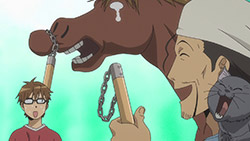 |
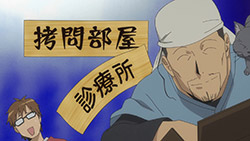 |
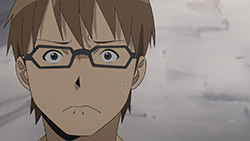 |
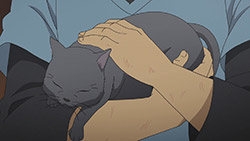 |
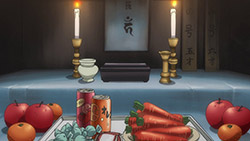 |
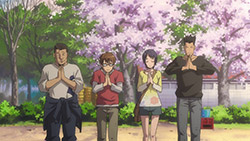 |
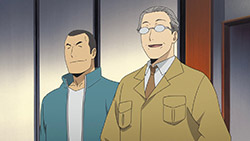 |
 |
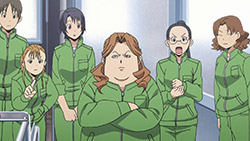 |
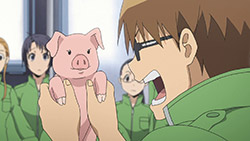 |
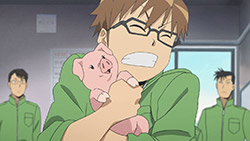 |
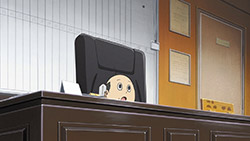 |
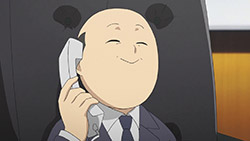 |
「八軒、豚丼と出会う」 (Hachiken, Butadon to Deau)
“Hachiken Meets Pork-Bowl”
This is the second series this season that’s made guilt a big part of the viewing experience.
It’s ironic that a series so grounded in unglamorous, smelly reality should stand out as exceptional as much as Gin no Saji does, but that says something about the standard templates that this medium uses to paint its pictures. I continue to believe that if someone other than a famous mangaka with a track record of massive sales had written this series it would never have become a commercial success, because not enough readers would have given it the initial chance that hooked them into it – and that’s assuming anyone would have published it in the first place, which is hardly a given. As far as being adapted into an anime – a far more limiting and risk-averse channel than manga – forget about it.
But that’s not how it is, because Arakawa Hiromu chose to roll the dice and write a story that completely broke with her past successes, and thank goodness she did. I’m always pleased when a series I go into with huge expectations meets them, and this one has. I haven’t read the manga so my expectations were based solely on reputation, and my response wasn’t that I was blown away immediately. Rather, it was of being impressed that Arakawa had created a world that felt very real and easy to slide into as a viewer, with characters that immediately seemed recognizable (I’m sure her signature characters designs are psychologically important in that). The emotional buy-in has been more of a slow build but it’s kicking in hard now, both for Hachiken and for the larger themes at play in the series itself.
As a lapsed vegetarian, I’m quite interested in the way Silver Spoon approaches the notion of agriculture and the sentimental side of raising livestock (which is of course a non-factor in industrial farming, which is the lion’s share of agriculture today). This is the world Arakawa-sensei grew up in and she knows it well, and she seems to be charting a middle course of sorts. I’ve seen praise lavished on Gin no Saji for "not sugarcoating" the hard realities of farm life and meat production, and while to be truthful she is sugarcoating – there are disturbing things we’re not seeing, and Ooezo is far from the most vile type of commercial farm – philosophically I agree that she’s being pretty realistic. We’re seeing the cute animals that make up our buta-don and smoked chicken and hamburgers, and the realities of the way they’re raised (though again, being spared an unduly harsh vision of it). As an outsider to all this, Hachi-kun is playing the classic audience proxy – like the vast majority of the readers and viewers of Silver Spoon he knows next to nothing about farming, and develops emotional attachments to the animals he’ll later be enjoying for breakfast and lunch.
Watching this show can be pretty uncomfortable for me, to be honest, because I tried to be a vegetarian and while I lasted for a couple of years in the end I just couldn’t hack it. I know pigs are extremely smart, but I still love to eat them – and that fact doesn’t make me especially happy. Piglets make a perfect vehicle to explore this dilemma because in addition to the fact that pigs are far more recognizably like "pets" than cows or chickens, piglets are so damn cute. We’ve seen this runt of the litter story many times, but it always cuts to the heart. I certainly can’t blame Hachiken for feeling sorry for that little pig relegated to the eighth teat (and the "hachi" part just makes it even more of a slam-dunk) but his fellow students are right – if he names that animal he’s simply indulging his own sentimentality. Tamako is right to tell him to call it "Porkbowl" because that name will remind him every day of what will happen when the little one is three months old. Whatever you feel about eating meat, I think people should fully understand the process of how it gets into their bellies. It’s a decision everyone needs to make for themselves and like most decisions, it’s one that should be made in full possession of the facts involved.
Another element of rural life that’s portrayed with an admirable lack of sugarcoating this week is the "Ban’ei" racing. This is unique to Tokachi and has been on the decline on recent decades, and frankly it’s easy to see why. Superficially it bears little resemblance to the glamorous world of thoroughbred racing – these are stocky, brutish draft horses pulling sleds loaded with cinderblocks at a walking pace. But they do share a commonality, in that the mortality rate for the participants is appalling in both sports. With thoroughbreds it’s because these animals are designed for the express purpose of winning at the racetrack, which makes them fragile and easily injured (which with horses, usually means death). For the horses of ban’ei it’s a testament to the brutality of what they’re forced to do (seriously, I was expecting Mikage’s horse’s leg to snap – and it happens all the time). It’s an ugly spectacle, with roots in the hard, cold life of Hokkaido farmers. As Mikage’s uncle tells Hachiken, most of the unsuccessful horses end up as horse meat. In a sense this sport offers animals who’d otherwise be killed a chance to live on – but does that end justify the means here?
It’s hard to say just exactly what Arakawa’s view on all this is – for now it seems to be that middle course I referred to. She’s saying she understands the way some of the things we’re seeing impact us emotionally, but also asking for understanding of the people who make their livelihoods off of them. Whether that’s enough will depend on the viewer, but so far it’s undeniably working from a narrative standpoint. Probably the most interesting single element of the episode was the meeting with the veterinarian at the racetrack who, cat on shoulder, takes the kids through the uses of his various weaponry (Hachiken is appropriately shocked). His notion of what it takes to become a vet? "You have to be able to kill." he says matter of factly. You’re often asked to be the arbiter of life and death, especially where livestock are concerned. But he also says that by shouldering that burden you can do real good – saving the lives of animals that might otherwise be lost. He too seems to have charted his own middle ground, and found a path that he can accept and one that makes him feel fulfilled. It’s a path that everyone would feel likewise about, that’s for certain.
As for Hachi-kun himself, we continue to be given dribs and drabs of exposition about his past. It’s clear he "lost" at something he considered important (could it be as trivial as the top rank in his class?), and that’s one reason he wanted to go far away from home for high school. He seems to have tried to emotionally cut all ties with his family. His argument with the baseballer Komaba Ichiro (Sakura Tooru) is quite illuminating, as well as being quite realistically portrayed. He speaks of how important it is to win, then in-turn decries how unfair it is that livestock (like the draft horses and the unlucky smoked chicken) aren’t rewarded for trying their best. He speaks enviously of Ichiro’s secure life, where he never had to study to get into high school and has a job at the family farm waiting for him – not realizing that Ichiro’s father has died and his mother is managing the place on her own while Ichiro matriculates. Ultimately the two boys come to realize – given some additional perspective from the vet and the somber funeral for one of the ban’ei horses they happen upon – that each simply lacks understanding of the other’s life and problems, for now, and they reach a sort of peace (though Ichiro’s apparent closeness to Mikage is surely going to test it).
That vet says something which I think can be applied to both the series’ larger themes and to Hachiken’s personal ones. "In all things, I think having a dream requires having the resolve to struggle with reality." Gin no Saji seems very concerned with the inevitable conflict between the ideal and the real – the compromises we must make in order to adapt to the harsh world we live in. As with most about this series, that notion is deceptively deeper and more powerful than it initially seems. It’s a very mature, subtle premise to build a series around and one that’s rarely explored in anime form, and that’s one reason I think this series has a chance to be really special – and why it’s struck such a nerve with the manga readership. Anyone who read Fullmetal Alchemist or watched Brotherhood surely knows that Arakawa is a writer who’s extremely adept at exploring the difficult questions of existence, but without the trappings of fantasy that FMA explored those themes are largely laid bare here, carrying the entire series on their shoulders. Not many authors would have tried it, or been given the opportunity to even if they had the will – and I’m very glad Arakawa chose to pursue this course.

Oh the irony, what if pork bowl doesn’t become a pork bowl?
Show Spoiler ▼
it becomes SPOILERS
not that it’s a particularly impactful spoiler but come ON dude
Nope…it become SPOIlED PIG…
A few moral lessons and reality in one episode.
I really like how this anime is handled but somehow the comedy from the manga appear to be more effective to invoke laughter or a chuckle.
Superb writeup, but man do I love pork…
So… They don’t wait for pigs to grow up before killing them for meat, huh? Like veal? What’s the point of piglet meat anyway other than just because they can? I highly doubt that pigs can grow full in mere 3 months, it’s not some genetically modified and antibiotic/steroid-hooked chickens, you know. I admit that I went to farm high school (up in the mountain), but it only had horses and cows (no pigs or chickens) and it’s the first time I hear about piglet meat. At least in Japan, I suppose. Or so I thought! Upon a quick googling, such practice (“suckling pig”, it says) seems to definitely exist. And not just Japan or Asia in general, but some parts of Europe and (southern) U.S. as well.
Well, I guess I shouldn’t be surprised at things like that. Humans can adapt and eat anything, give them a little time. Looking down on folks eating grasshoppers and bugs, do you? Give a little time. If it moves and there is nothing else to eat, you and I will eat it -although I myself will resist eating one ’til the end, though. They will come up with way to clean up/process those (i.e. cutting off head/feet or turn them into powder) for weaker souls, but just wait.
BTW, I don’t mean to troll anyone who eats pork since I do occasionally, but ever since I read that they used to call humans “pig humans” as human meat taste most closer to pig meat to those who ate it -or so they say- in Southern America where cannibalism was rather prevalent in the past (some 2-300 years ago), eating pork has never been the same for me. Yep, sorry I did this, but you will get over it like me. That and talks like pigs are more intelligent than dogs in some sense didn’t exactly deter me from eating pork, so why should you?
In any case, this show is an interesting case for me as while I recognize many points from personal standpoint/experience, there are unmistakably cultural differences I find in every episode.
It’s the ‘long pig’, son. Long pig. And everything tastes like chicken anyway.
I didn’t realize that pigs were slaughtered that young for bacon but then you really don’t want to know how veal is made either.
And here I was planning to get pork chop for dinner… -_-
Joke aside, the show does tackle the harsh reality of dream nicely, educating about the world of agricultural without getting too dull or depressing. Nice.
I cried when Hachiken asked what is needed to be a vet and the guy answered you need to be able to kill.
ahhh best adapted episode so far!
Surprisingly the comedic bits are translating over nicely.
I loved how honest you were in your writeup. I once read somewhere that if everybody would just cut down on their meat intake by 20%, it would help save the lives of a billion (???!!!) animals every year. I’m definitely trying to do my part–going cold cut veg is a major decision, but watching this anime and reading posts like yours makes me want to make the jump. C: Keep the wonderful articles coming!
Thanks. I have significantly reduced my red meat and poultry intake since before I became a vegetarian – probably less than a third of what I ate then. But it feels like a hollow victory. You’d think Japan would be an easy place to be vegeratian, but it’s actually harder than the US. Chicago or California, anyway. If you wanted to eat fish everyday, sure – but that’s not vegetarian and though I love sushi I could never eat fish every day.
Pork is the one that bothers me the most, morally, yet it’s also the one I find hardest to resist.
but animals are delicious
My family owns a farm so I know this, but its not a victory at all. The sad and brutal truth is that famers have limited space and limited funds. It costs money to raise and keep animals. So if the demand for a certain animal is less, the farmer will simply keep less of that animal on their farm. You’re not saving any pigs, or cows, or sheep or whatever when you decide to become a vegetarian. This is especially true when it comes to cows, cows are expensive to raise, and they consume a lot of resources, so if the demand for cows are less then they really won’t raise as much. Livestock animals are not pets, they are raised for your consumption that is the message of this episode.
In any case, if you’re trying to go for a vegetarian diet, be very careful. You still need to get the nutrition that you get from meat. You probably see a nutritionist or your doctor before you really start, don’t try to do it on your own. I’ve seen a lot of people get sick from trying to become vegetarians on their own.
@Chan, You’re right in principle. it won’t save any lives. It’s really not hard to see – All things must die.
If less animals lived, then less animals would be killed. I guess that’s the sort of hollow victory some people are going for, but there are much better reasons for being vegetarian.
@Enzo I don’t have any moral issues with eating pork. I think you have to respect every life that died to keep you fed, but I don’t see any reason to differentiate a pig’s death to the death of a fish or the death of a plant. Everything I eat is the death of some organism. That’s life. I wish it wasn’t but you just got to accept it.
When the show started it looked like it was going to be just the yucky/funny part of farming such as the manure, getting up at an ungodly hour, and the “eggs”. It’s turning into something quite affecting. The vet’s “you have to be able to kill” hit me hard because it’s a brutal truth. While the show can be quite funny and the information about farming is interesting to a city boy, underneath there is the hard reality of life. I was particularly hit by the fact that the girls were the ones that really chastised Hachiken over “Porkbowl”. They were probably the ones who did the same thing when they were younger. As you say, I was fully expecting Miage’s horses leg to snap. The only difference is that I expected it at the top of the obstacle when it was trying to get up. It’s hard to look at this when you realize that we’re subjecting animals to possible injury or death for our enjoyment. Of course without that, those breeds might not even exist anymore since the reason for their existence has been replaced by vehicles. The Swiss Bernese Mountain dog almost disappeared because it was no longer needed to pull carts for example. The same goes for those animals that we wouldn’t be eating if we were vegetarians. Those cows and chickens wouldn’t be roaming around enjoying life because they would never exists in the first place.
Gin no Saji or just Silver Spoon is a very different beast. Show Spoiler ▼
“Pork Bowl” – What an ominous yet fitting name to give to an animal destined to be eaten by humans. LOL
So that’s how Tamako manages to store up all those extra “muscles” during her free time. In contrast to Nakajima-sensei, becoming a Raging Buddha whenever it concerns horseracing. XD
The teacher that recommended Hachiken try out Ooezo after seeing him looking disillusioned from missing out on the chance to enter the high school of his choice, he seemed like a good teacher, as he actually bothered to call up Ooezo’s principal just to follow up on how Hachiken is doing.
I got the sense there was a rather more immediate reason for that call, but I assume we’ll find out next week.
I guess we can talk about domestication as perhaps a symbiotic relationship, though that would probably only work through the lens of human hubris. Domesticated animals are, if we just go by numbers, incredibly successful. In some areas they even outnumber humans. They certainly are healthier and generally do better than wild ones–until we decide to put them down or eat them or whatever. Sure, if we subject humans to the same conditions, living and dying by our whims, there would be a bigger outrage but at some point long ago we decided animals were not on the same standard as humans. Whether this is right or wrong is very debateable, but it is what society at large has been living by almost since the dawn of time.
On some level we do it to humans too, though we generally value human lives much more than animals ones. Still, doctors also have to decide who lives and who dies. You can keep a person alive in ICU pretty much forever with modern medicine; the machines and drugs are just that good. But at some point a doctor decides to stop intubating the potato in the bed and let them go. I think drawing lines is the right idea. Reason is still a part of ethics.
So… cute……
*sadly looks at the bacon in the freezer*
leave it to gin no saji to drop some srs life knowledge on top of being a blast to watch…
this show is definitely coming down as a heavy hitter…genuinely good stuff here folks…
“…being impressed that Arakawa had created a world that felt very real and easy to slide into as a viewer…”
Heh, don’t get me wrong, there are a lot that the Mangaka has to create & FMA had showed that Arakawa Hiromu is very talented artist.
But do you know that she is a farmer’s daughter & that she went to that exact school? One could argue she didn’t actually create a world here rather than recollecting her past & her husband’s reactions to her farmer life.
“…It’s hard to say just exactly what Arakawa’s view on all this is…”
I’m pretty sure is “hey, that’s life, row with it.”
My rule-of-thumb: treat life well, eat life well; 80:20 rule for vegcarbs:meat
Porkbowl is still vastly superior to Wilbur
in this episode, I learned that a whole Macross is 56 hectares big.
Now i am actually motivated with your way with words-at all together with with the data format on your weblog. Is some sort of paid material or even did you adjust the item by yourself? Regardless stay inside the exceptional top quality writing, it really is uncommon to peer an excellent weblog exactly like it right now.